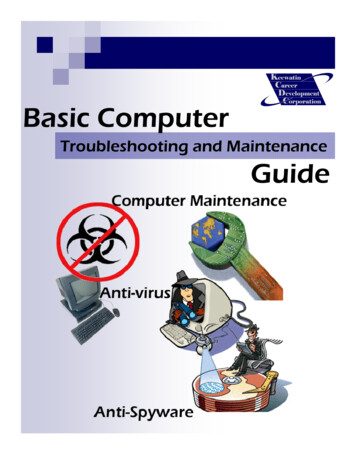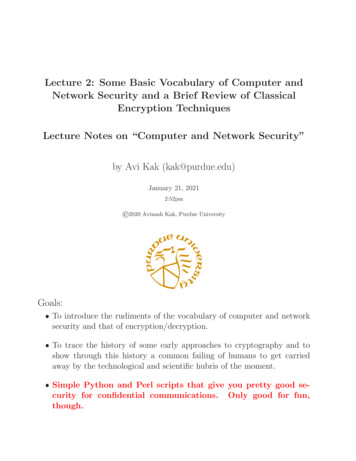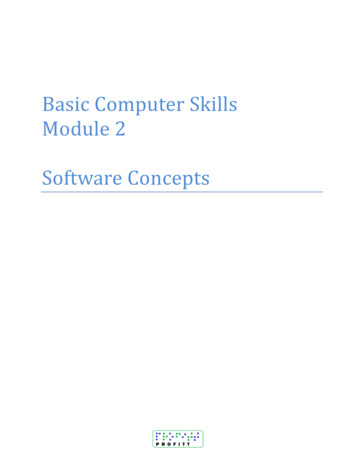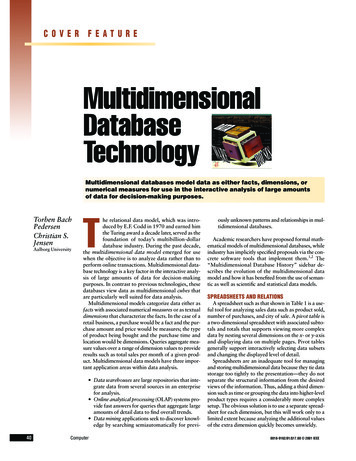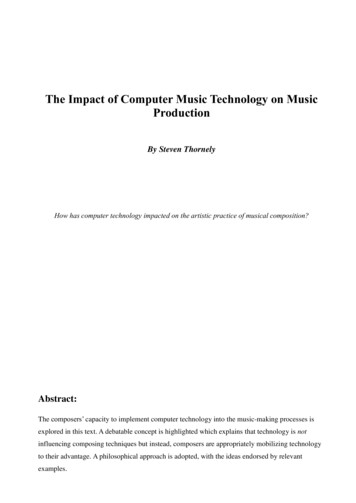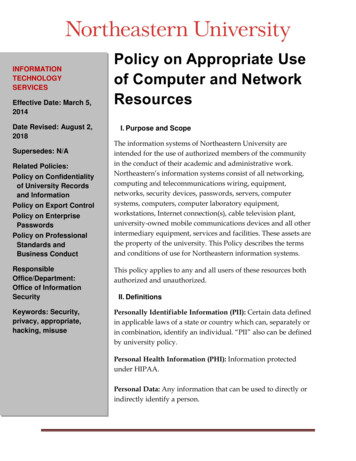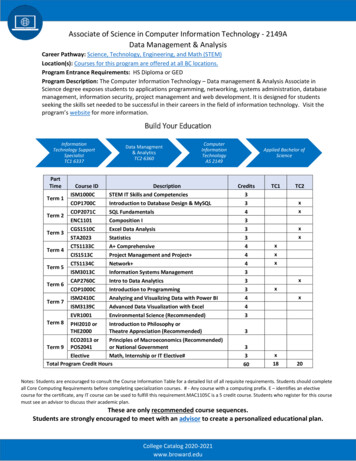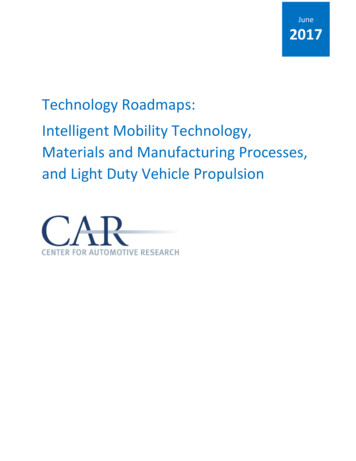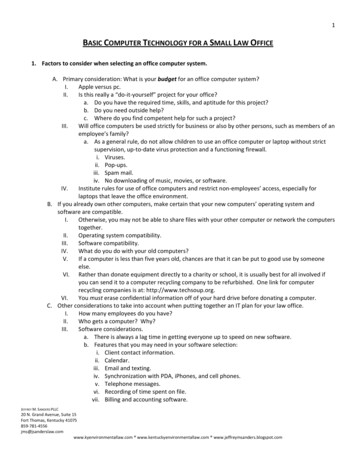
Transcription
1BASIC COMPUTER TECHNOLOGY FOR A SMALL LAW OFFICE1. Factors to consider when selecting an office computer system.A. Primary consideration: What is your budget for an office computer system?I.Apple versus pc.II.Is this really a “do‐it‐yourself” project for your office?a. Do you have the required time, skills, and aptitude for this project?b. Do you need outside help?c. Where do you find competent help for such a project?III.Will office computers be used strictly for business or also by other persons, such as members of anemployee’s family?a. As a general rule, do not allow children to use an office computer or laptop without strictsupervision, up‐to‐date virus protection and a functioning firewall.i. Viruses.ii. Pop‐ups.iii. Spam mail.iv. No downloading of music, movies, or software.IV.Institute rules for use of office computers and restrict non‐employees’ access, especially forlaptops that leave the office environment.B. If you already own other computers, make certain that your new computers’ operating system andsoftware are compatible.I.Otherwise, you may not be able to share files with your other computer or network the computerstogether.II.Operating system compatibility.III.Software compatibility.IV.What do you do with your old computers?V.If a computer is less than five years old, chances are that it can be put to good use by someoneelse.VI. Rather than donate equipment directly to a charity or school, it is usually best for all involved ifyou can send it to a computer recycling company to be refurbished. One link for computerrecycling companies is at: http://www.techsoup.org.VI.You must erase confidential information off of your hard drive before donating a computer.C. Other considerations to take into account when putting together an IT plan for your law office.I.How many employees do you have?II.Who gets a computer? Why?III.Software considerations.a. There is always a lag time in getting everyone up to speed on new software.b. Features that you may need in your software selection:i. Client contact information.ii. Calendar.iii. Email and texting.iv. Synchronization with PDA, iPhones, and cell phones.v. Telephone messages.vi. Recording of time spent on file.vii. Billing and accounting software.JEFFREY M. SANDERS PLLC20 N. Grand Avenue, Suite 15Fort Thomas, Kentucky ronmentallaw.com www.kentuckyenvironmentallaw.com www.jeffreymsanders.blogspot.com
2viii. Case management.ix. Legal research.IV.Do you want to network your computers together?V.Printer, scanner, fax and other shared office equipment.VI.Surge protectors.a. During a power surge or spike, there is excess voltage in the electrical lines above that whichis normal. A high quality surge protector can absorb the excess voltage and help preventdamage to your computer system.VII.How many office locations do you have?VIII.Is your office wired for a computer system?IX.Does your office have access to the Internet?X.File encryptiona. An encryption key is added to files or folders that you choose to encrypt. This key is neededto read the file.b. Lose the key and you may permanently lose access to the file.XI.Recovering office data in the event of a disaster.a. Backing up your electronically stored information.D. Standardizing desktop hardware, software, and configurations can help you manage your costs ofownership for your office computer system.I.Standardized approach may mean spending somewhat more up front on an office computersystem.II.It may, however, help save money in several ways through the service life of the equipment youbuy.E. How are you going to protect electronically stored information on your computers, laptops, servers, andportable storage devices from third parties?I.Generally, it is an ethical violation for an attorney to reveal information related to therepresentation of a client without authorization or a court order. See Kentucky Supreme CourtRule 3.130.2. What operating system will be used in your office computers?A. Windows XP Professional ‐‐II.Windows XP Professional requires a minimum 233 MHz processor (300‐plus MHz recommended),128 MB of RAM (higher recommended), 1.5 GB available disk space, super VGA (800x600)resolution or better, a CD‐ROM or DVD drive and a keyboard and Microsoft Mouse compatiblepointing device.III.Combined with base MS Office and basic local storage requirements for documents and e‐mail,overall disk space requirements are at least 8 GB.B. MacOS X ‐‐ Apple’s standard operating system for its newer Macs and MacBooks.I.Mac OS X requires a Mac computer with an Intel, PowerPC G5 or PowerPC G4 (867MHz or faster)processor.II.512MB of memory.III.9GB of available disk space.IV.DVD drive may be needed for installation.C. Is your selected or desired software compatible with your current computer’s operating system?D. Always keep your computer’s operating system current with the latest security patches.JEFFREY M. SANDERS PLLC20 N. Grand Avenue, Suite 15Fort Thomas, Kentucky ronmentallaw.com www.kentuckyenvironmentallaw.com www.jeffreymsanders.blogspot.com
33. What is your budget for your office computer system?A. You may pay substantially more for each computer and server if you want an Apple computer network.B. Expect to pay between 1,200 and 1,500 for a desktop computer and monitor.I.Desk tops last about five years or more, but this usually requires some upgrades of hardware andsoftware over the machine’s service life.II.A computer in the lower price range should serve your basic office computing needs, but it won'thave a lot of specialized features.III.Do you need a service contract on your desktops? It may be less expensive to replace problemparts inside a desktop computer than to repair.IV.Warning: Upgrading or replacing computers and software make it difficult to keep track of files,archived email and other electronically stored information that is not stored on a network serveror central archive.V.Don't take your eyes for granted. The higher the resolution, the better the graphics card you'llneed.VI.I recommend purchasing speakers for your office. If your PC doesn't already support surroundsound, for 100 or more you can upgrade to a dedicated sound card with Dolby 5.1 support, plus adecent set of speakers that includes a subwoofer.C. Expect to pay between 1,000 and 2,500 for a laptop computer.I.Our office upgrades laptops every two to three years.II.Expect to pay between 1,000 and 2,000 for an entry‐level network server.III.Do you want a service contract on your laptop?D. Printer, scanner and fax machine(s).I.Selection and cost of printer dependent on projected number of number of printed pages permonth.II.Suggest service contract on this type of equipment.III.Keeping track of printed pages for billing purposes.a. Warning: fax may require a dedicated phone line, which means another monthly charge bythe phone company.E. Software considerations.I.Microsoft Office 2007.II.OpenOffice.org.III.Google’s free software.IV.Adobe Acrobat Professional.V.Time slips and Quick BooksVI.Anti‐virus software.i.Every computer that connects to the Internet must have anti‐virus software installed;updated regularly to ensure software is up‐to‐date.VII.Summation, Trial Director, and other specialized software for law offices.VIII.Are you willing to invest time and money to train on software? Is there a local training source?F. Each member of your staff will likely require access to base‐level applications: word processing, email, andInternet.I.Clerical and administrative staff may also need Microsoft Excel, Time Slips and Quick Books.a. Expect to pay a software license fee for each licensed program that you install on eachcomputer.II.Specialized software, such as billing and accounting, PowerPoint, Summation, trial presentationsoftware.III.Attorneys and paralegals will need legal research software: Lexis Nexis, Westlaw, and Casemaker.JEFFREY M. SANDERS PLLC20 N. Grand Avenue, Suite 15Fort Thomas, Kentucky ronmentallaw.com www.kentuckyenvironmentallaw.com www.jeffreymsanders.blogspot.com
4G. Some software programs ‐‐ such as graphics, photo and video programs ‐‐ require large amounts of RAMand hard‐drive space in order to properly operate.I.The larger the files, experts recommend faster processor speeds, greater RAM, and larger harddrive storage.II.Word‐processing and e‐mail require relatively little storage space and RAM.H. Paperless Office ‐‐ fact or fantasy?I.Scanning documents rather than making paper copies.II.Fax networked to provide a scanned copy rather than paper copy.III. Using Adobe Professional to create letters and sending them out as email attachments.IV.Complex litigation in federal court practice.a. E‐filing.b. E‐discovery issues.c. Exchanging e‐documents.d. Experience with review of electronic documents.J. Monthly access fee for Internet service.I.The faster the line connection, the better for internet service.II.Anti‐virus software and spam blockers.4. Plan out your IT strategy for your law office.A. Do you want a desktop or a laptop computer?B. Standard features such as CD‐ROM or DVD drive, and modem can be found on both desktop and laptopmodels.C. Computer speakers, photo albums, music, and video.D. Usually, faster processor speeds and larger hard drives are available on desktops.E. Laptops offer the advantage of being mobile, but with some sacrifice in speed and storage capacity. Thoselatter factors may be somewhat relative to the price you're willing to pay, however.F. If you expect that the computer will be used for “extracurricular activities” like gaming or internet surfing,you need to keep those items in mind in selecting a new computer.G. The more installed memory your computers have, the more applications you can run smoothly at once,and the better the system will perform.5. Laptop versus a desktop.A. The main reason to have a laptop computer is portability ‐ the ability to take your computer with youwhen you leave the office.I.If you don't need portability, then you should probably buy a desktop.II.Laptops come in all different weights and sizes. Keep in mind if you travel with your computer,especially in airports, lighter is much better than heavy.III.Portable hard drives may be far less expensive alternative than purchasing a larger hard drive on alaptop.a. Portable hard drives are good for music, photos, and video files.b. Portable drives are good for storing large files, such as scanned images of files.IV.If you really travel a lot, but don't want to carry around a laptop, a Blackberry, Palm Treo, or aniPhone might be a better choice.a. Are you simply going to check email on the road?b. Editing, revising and amending documents require the use of a laptop.B. Laptops are smaller in size than a desktop, so it takes up less physical space in office.JEFFREY M. SANDERS PLLC20 N. Grand Avenue, Suite 15Fort Thomas, Kentucky ronmentallaw.com www.kentuckyenvironmentallaw.com www.jeffreymsanders.blogspot.com
5I.Specifications comparable to desktop specs ‐‐ if you're willing to pay the purchase price of a highend laptop, but Laptop prices are dropping.6. Laptop’s downside.A. Laptops cost almost twice as much as desktops and the cost of repair is very high ‐‐ if you can find aqualified technician to repair a laptop.B. Laptops are easily lost or stolen.I.According to FBI statistics, approximately 2.6 million laptops were stolen in 2008.II.Don’t leave laptop computers in an unattended car.III.Thus, avoid storing passwords, social security numbers, credit card numbers, details about familymembers, clients, or other personal information on your laptop computer.IV.Careless handling of client information may violate Kentucky Supreme Court Rule 3.130.C. Laptops are not easily upgradeable.D. Laptops generally have slower processor speeds than a desktop. A laptop’s processor speed is almostalways slower than a desktop with the same features.E. Smaller keyboard and monitor than most desktop computers.F. Laptops will break if dropped or liquid is spilled on them.G. Our office’s experience over the past 10 years is that a laptop has an average service life of just 2 to 4years.I.That is a lot of toxic materials going into a landfill.II.Computers contain lead, cadmium, hexavalent chromium, mercury, and brominated flameretardants.III.Newer batteries (nickel‐metal hydride and lithium ion) do not contain cadmium.H. A laptop’s battery useable life substantially decreases over time. That fact can be a real pain whentraveling on an airplane or sitting in an airport terminal without access to electricity.7. Desktop’s benefits.A. Lower initial price.B. Usually faster processor speeds, memory size and RAM in a desktop than in a laptop.C. Much easier to upgrade a desktop than a laptop. This is true whether you are upgrading internalcomponents, such as RAM, a hard drive or a video card, as well as external devices such a monitor.D. A desktop normally has a longer service life than a laptop.E. Usually more USB ports on a desktop than a laptop.F. Larger monitor is possible with a desktop.8. Desktop’s downside.A. Lack of mobility.B. A desktop computer takes up a lot of space in your office.C. You are going to have a desktop for a long time.9. Implement your office’s IT plan.A. Standardize your office computer system.I.A "one size fits all" approach to selecting computers requires little effort to maintain oncecompleted ‐‐ at least, for the projected life of the computer systems involved.II.A "cookie cutter" strategy that's the same for all standard computers.III.Employee training on standard hardware and software can also be standardized.JEFFREY M. SANDERS PLLC20 N. Grand Avenue, Suite 15Fort Thomas, Kentucky ronmentallaw.com www.kentuckyenvironmentallaw.com www.jeffreymsanders.blogspot.com
6IV.V.VI.a. May require some job‐specific software training, such as training on accounting and billingsoftware, database management software, and trial presentation software.Much easier to manage and maintain a single standardized office computer system.a. For example, what an employee learns about one computer applies to other computers inoffice.b. Employees can move from machine to machine, if or when necessary.Standardized computers help to prevent squabbles over equipment.Suggest using a top down approach in selecting computer equipment. That is, selecting thecomputer that suits the needs of most demanding user.10. Do you plan to network your office’s electronic equipment?A. Networking is linking two or more computing devices together to share data, software and commonlyused or needed equipment in the office, like a printer or fax.B. A server is a computer specifically designed to hold, manage, send, and process data.C. A computer that has been set aside to run a specific server application.D. Absolute CPU speed is not usually as critical to a server as it is to a desktop or laptop computer.E. What type of files are you going to store on your network server?F. What type of software are you going to run off of your server?11. If your office only has three or four computer users, you may not need a server at all.A. A peer‐to‐peer network is the simplest type of network available and is most suitable for offices with lessthan five computers.B. In a peer‐to‐peer network, each computer is connected directly to every other computer.C. There is no central server managing the network.D. A peer‐to‐peer network allows an office to share files, printers and even modems and Internetconnections.E. In general, a peer‐to‐peer network consists of two or more computers connecting through a device calleda “Hub.”I.A hub allows multiple computers and devices to connect via network cable.II.Peer‐to‐peer networks do not offer many of the benefits of client/server networks.III.As an organization and network grows, the administration of these peer‐to‐peer networksbecomes more difficult and expensive.F. Without a network server, each employee stores the files that they create on their computer hard drive.G. Office‐wide back up is usually done by copying files onto a portable storage device, such as a portable harddrive.H. This arrangement may make it difficult to keep track of and share documents within an office.I. At the same time, a peer‐to‐peer network may make it easier to keep electronically stored informationconfidential within a small office environment.12. Once you have five or more computer users, a network server can provide a central location for yourimportant files, shared applications, and other resources you regularly use, like documents, printer, andemail.A. Usually this setup is called a client‐server network. In a client‐server network, all computers areconnected to a dedicated server and the server manages the network.I.The server stores email, Web pages, files and/or applications. Computer stations are linked to aserver rather than to each individual machine.II.Primary advantages of a computer network in your law office are:JEFFREY M. SANDERS PLLC20 N. Grand Avenue, Suite 15Fort Thomas, Kentucky ronmentallaw.com www.kentuckyenvironmentallaw.com www.jeffreymsanders.blogspot.com
7III.a. Ability to share information among the users on the network. For example, this can bemessages such as e‐mail or it can be files that are stored on one computer and used bysomeone at a different computer.b. Users store their work on the server rather than on their desktop computers, making dataless vulnerable to system crashes and other computer problems.c. Ability to share resources among users on the network. Perhaps most important is sharingof hardware, such as a printer.d. For example, a single printer can be accessed from different computer systems, as sharedresource.e. A single Internet connection can be used by more than one computer.f. The network administrator determines what the computers may be used for and what kindof resources and support they are entitled to have.g. Instead of having this data stored in several different computers, as their users create it,data can be centralized on shared servers.h. Control over access to electronically stored information and other office equipment is mucheasier to maintain if the computers are networked.i. Only if authorized by the administrator does a computer user have access toelectronically stored information on the server.i. A network allows you to keep control over the computers in your office, and gives you anability to monitor usage of the computer.j. A network makes it easier to backup your office data onto an offsite server, a set of tapes,CDs, or other backup systems.Primary disadvantages of a computer network in your office:a. Additional costs in hardware and software, as well as funds for planning, designing andimplementing the network.b. May require the services of an IT professional to do ongoing maintenance and managementof the network.c. You must establish and enforce office security procedures, such as password protection.d. Depending on specific rights assigned by the network Administrator, an internet connectionmay allow employees to abuse of company resources, distractions that substantially reduceproductivity, downloading of illegal or illicit materials and software piracy.e. Networking allows sharing of undesirable data among computers.f. Internet virus can be downloaded and spread over office network. Preventing andmitigating the potential harm to your network costs time, money and administrative effort.13. Local Area Network (“LAN”) is the most common network that links computers in the same building or office.A. Computers in a LAN are usually linked together with a cable made up of pairs of wires, but faster (andmore expensive) cables are made from glass fibers, called fiber optic
VI. Anti‐virus software. i. Every computer that connects to the Internet must have anti‐virus software installed; updated regularly to ensure software is up‐to‐date. VII. Summation, Trial Director, and other specialized software for law offices. VIII.File Size: 205KB


